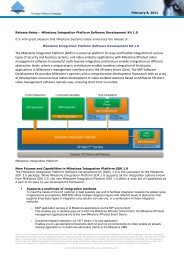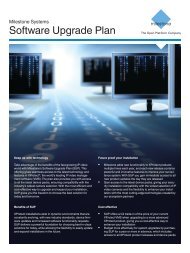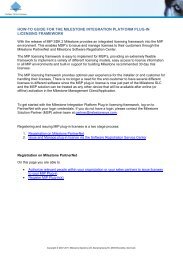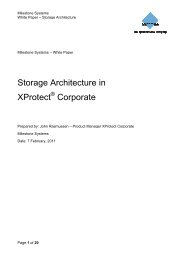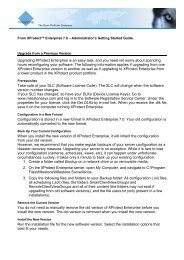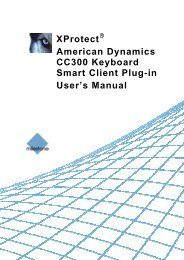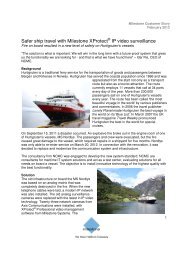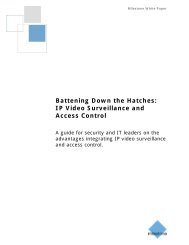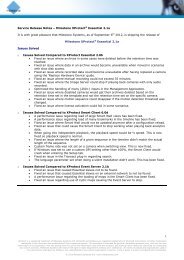XProtect Express 1.1; Administrator's Manual - Milestone
XProtect Express 1.1; Administrator's Manual - Milestone
XProtect Express 1.1; Administrator's Manual - Milestone
You also want an ePaper? Increase the reach of your titles
YUMPU automatically turns print PDFs into web optimized ePapers that Google loves.
<strong>Milestone</strong> <strong>XProtect</strong> ® <strong>Express</strong> <strong>1.1</strong><strong>Administrator's</strong> <strong>Manual</strong>Common tasksAbout handling daylight saving timeDaylight saving time (DST, also known as summer time) is the practice of advancing clocks in order for eveningsto have more daylight and mornings to have less. Typically, clocks are moved forward one hour during the springseason and adjusted backward during the fall season. Note that use of DST varies between countries/regions.When working with a surveillance system, which is inherently time-sensitive, it is important to know how thesystem handles DST.Spring: Switch from Standard Time to DSTThe change from standard time to DST is not much of an issue since you jump one hour forward. Typically, theclock jumps forward from 02:00 standard time to 03:00 DST, and the day thereby has 23 hours. In that case,there is no data between 02:00 and 03:00 in the morning since that hour, for that day, did not exist.Fall: Switch from DST to Standard TimeWhen you switch from DST to standard time in the fall, you jump one hour back. Typically, the clock jumpsbackward from 02:00 DST to 01:00 standard time, repeating that hour, and the day thereby has 25 hours. In thatcase, you will reach 01:59:59, then immediately revert back to 01:00:00. If the system did not react, it wouldessentially re-record that hour, so the first instance of, for example, 01:30 would be overwritten by the secondinstance of 01:30.Because of this, <strong>XProtect</strong> <strong>Express</strong> will forcefully archive the current video in the event that the system timechanges by more than five minutes. The first instance of the 01:00 hour will not be viewable directly from clients.However, the data is recorded and safe, and it can be browsed using the Smart Client application by opening thearchived database directly.Improve stability with 3 GB virtual memoryMicrosoft Windows 32-bit operating systems can address 4 GB of virtual memory. The operating system kernelreserves 2 GB for itself, and each individual running process is allowed to address another 2 GB. This is a defaultsetting in Windows, and for the vast majority of <strong>XProtect</strong> <strong>Express</strong> installations it works fine.As from <strong>XProtect</strong> <strong>Express</strong> 6.5, the main components of the server—the Recording Server service and the ImageServer service—have been compiled with the LARGEADDRESSAWARE flag. This means you can optimize thememory usage of the <strong>XProtect</strong> <strong>Express</strong> Recording Server and Image Server services by configuring your 32-bitWindows operating system so that it restricts the kernel to 1GB of memory, leaving 3GB of address space forprocesses compiled with the LARGEADDRESSAWARE flag.This should improve the stability of especially the Recording Server service by allowing it to exceed the previous 2GB virtual memory limit, making it possible for it to use up to 3 GB of memory. The change in Windowsconfiguration is known as 3 GB switching.When is 3 GB switching relevant?For very large <strong>XProtect</strong> <strong>Express</strong> installations and/or for installations with many megapixel cameras it can berelevant to change Windows settings so that only 1 GB of virtual memory is reserved for the operating systemkernel, leaving 3 GB for running processes.If you use the Windows default setting, with only 2 GB virtual memory reserved for running processes, theRecording Server service in very large installations of <strong>XProtect</strong> <strong>Express</strong> may:www.milestonesys.com 163 Common tasks





